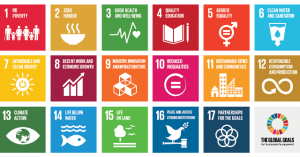Citizens in Asia throng the streets demanding implementation of SDGs
With three objectives of generating awareness, enforcing accountability and creating impact, the global citizens called to #Act4SDGs and held various forms of mass actions across the world.

Agenda 2030 was adopted by 193 member-nations of United Nations in 2015 to pave the way for a sustainable world, which would adequately meet the needs of the current generation without endangering the lives, livelihood and liberty of the future generations.
A cluster of 17 ambitious goals and 169 targets were formulated to mark a departure from the ongoing development course, which has led to excessive use of natural resources resulting in climate change.
However, successful implementation of the ambitious agenda holds the key to its achievement. Governments alone cannot take them to the desired end. Other actors of the society like the civil society, the private entities and the citizen at large have a role to play.
“The civil society has a vital role in spreading awareness and monitoring the implementation of the goals.”
With these responsibilities in mind, we at Action for Sustainable Development (A4SD), Global Call to Action Against Poverty (GCAP), UN SDG Action Campaign celebrated the “Global Day of Action” this year to mark the third anniversaryof the adoption of the Sustainable Development Goals (SDGs) on September 25.
Also Read: Role of CSR in Achieving SDGs
With three objectives of generating awareness, enforcing accountability and creating impact, the global citizens called to #Act4SDGs and held various forms of mass actions across the world. The campaign started last year itself.
In Asia, the civil society network, Asia Civil Society Partnership for Sustainable Development (APSD) also joined the campaign. Citizens in eight countries of Asia demanded actions from the governments.
Actions on awareness and advocacy in Nepal and Pakistan: Ageing Nepal, a NGO working for the old people in Nepal organised rallies and sports competition among the elderly in Nepal. They also participated in games like musical chairs, apple eating competition, spoon race and pot-breaking competition etc to draw the attention of the policy makers to the needs of the elderly in the framework of SDGs.
In Pakistan, the members of Pakistan Development Alliance submitted a memorandum to the newly elected Prime Minister Imran Khan to implement SDGs in Pakistan.
Inequalities in India: In India, Wada Na Todo Abhiyan, a strong network consisting of 4,000 NGOs engaged the youth to spread awareness on the SDGs and key communication material were prepared on inequality of the Dalits – the group facing discrimination owing to their work and dissent.
The following video highlights the unsavory experience a manual scavenger (A Dalit) has to go through to make ends meet.
The social workers of Gopal Kiran Samaj Sevi Sanstha from Madhya Pradesh province of India took out a candle march as part of their awareness campaign. They also held discussion sessions with children; self help group women and jail inmates on SDGs.
“Coastal cleanup and conservation in Philippines and Sri Lanka: In Philippines, the Philippines Rural Reconstruction Movement undertook coastal cleanup programme with participation of the citizens on the occasion.”
In Sri Lanka, SUNFO Lanka organised a 1,200 meters long (collection of) banner on the coast in Sri Lanka with messages on SDGs and climate change.
Also Read: Education: The path to curbing child marriages
Seminars in Japan, stand-up campaign in Bangladesh and social media actions in Afghanistan: Japan Civil Society Network on SDGs organised seminars on SDGs and disaster.
The civil society members in Bangladesh did a “Stand Up for SDGs Programme” in front of Bangladesh National Parliament in its capital Dhaka. The citizens in Afghanistan led by Sanayee Development Organisation undertook social media actions demanding peace in the country.
“These actions by the citizens are likely to have spiraling effect in spreading information on SDGs so that more and more people can demand actions.”
In turn, the government authorities are likely to put policies in place owing to the demands of the citizens and pressure from the civil society for realising various goals under Agenda 2030.
